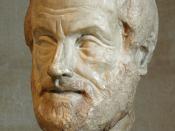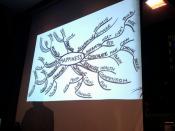This is an investigation of Aristotle's conclusions about the ultimate end, the highest good attainable by humans. The ultimate end for humans is the highest good because what is 'good' is a matter of philosophy, for which the exclusively human attribute of rationality is necessary. He reasons that the highest good is a pure kind of happiness that does not involve any loss of virtue. The desire for happiness in the form of bodily pleasure often compromises virtue, but pleasure of the mind is more pure. Pleasure of the mind, such as that resulting from contemplation, is pure and good because it poses no threat against virtue. This kind of happiness is the ultimate human end, according to Aristotle.
First, this report will demonstrate by an explanation of his findings that Aristotle's idea of the highest good is not an act, nor is it satisfaction from the accumulation of virtuous acts, but rather an experience of pleasure.
Next, this report will challenge his idea that there is pleasure 'of the mind' that is different from bodily pleasure, and show that what Aristotle proclaims to be the ultimate human end actually involves bodily pleasure.
The highest human good, according to Aristotle, is an end that is sought for its own sake and not for the purpose of achieving some greater end. This is logical, because any end we value because of its ability to advance us toward some other end is inferior to the end it seeks. The highest human good is superlative. It must be complete in itself. For this reason, 'happiness' is a suitable candidate for the ultimate human end.
Happiness is different for different people. Aristotle disagrees with his teacher, Plato, about the highest good as it is described by Plato's Theory of Forms. To conceive of...


